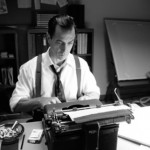Some General Thoughts about Documentary Film
Documentary film is one of my go-to genres (thank you, Netflix!). It enables me to encounter other people’s experiences outside my own limited context (which is not to disparage my context … all contexts are limited). It enables me to shut up and listen. I can’t interject my own thoughts or perspectives in the moments spent watching a documentary. I have to sit with the perspective of the subjects. Even if I don’t agree with the perspective, at least for that time frame, I am learning to see the world as they do.
It’s ok to stand back later and challenge the assumptions of a documentary or to fact check its information, but it’s also good to sit with the perspective for a short while before doing that. I love that devices are not welcome in movie theatres. There is no Googling or live tweeting. There is only listening and taking notes. It is an exercise in empathy.
Documentary film is also an exercise in lack of judgmentalism of its subjects. If the documentarian tries too hard to intervene with their own judgments of a character, the project will turn into a preachy exercise of telling instead of showing.
But a contrast of two of the films I saw at the festival (and of the filmmakers’ attitudes) reveals that it matters who you choose as a subject for your documentary. I have a lot of criticism for one film that I saw at the festival: The Horn (dir., Frederik Jan Depickere). My criticism has nothing to do with the technical execution of the film; it is beautiful film cinematographically and is well put together technically.
The Horn tells the story of a criminal and guerilla from Columbia who fakes political refugee status to get into Sweden. He spends the entire film walking around beautiful landscapes in Sweden, the ice crackling under his feet, and speaking in a slow, deep voice his nihilistic philosophy (I’ll admit, the guy does have a great voice). Look! Tony Soprano in Sweden! What an artistic coup! Oh, look, here are Northern Lights! Here is a dominant alpha man talking about his hardscrabble life of crime while chilling music, evoking psychological horror, plays in the background. The director spoke after the film, and I have to say he seemed to care very little about the title character. And yet, at one point he strangely said he admired the man (ok … ) and was seeking to be nonjudgmental in his film. It all felt like a hubristic film-school exercise: Let’s find the most awful human being we can and let him talk without judging him or fact-checking him (the director said he didn’t fact-check because “I’m not a journalist”). Never mind that we are handing a microphone to a narcissist who feeds off attention. The important thing is that we creating an artistic film without judgment!
In case my tone was unclear (unlikely), I find this kind of film morally repugnant. It does nothing but glorify a monster, and it does it as a cynical film school exercise in relevance and artistry.
The casual, unfeeling attitude of The Horn’s director contrasted greatly with the empathetic, knowledgeable, and conscience-laden work and tone of director Jesse Nesser (Walk with Me). Nesser had found a documentary subject worthy of focus, had sought to portray him honestly, knew tons of information beyond what was in the film, sought to examine this subject from multiple perspectives (including critical ones), sought a higher purpose than his own hubristic artistry, and did it with good technical execution as well. What a difference it made!
I’m not trying to completely dismiss the idea that good, important films can be made about awful people. Humans are complicated beings; every hero has some bad in him, and generally even villains have some good in them. And most of us are in the middle, a mix of good and bad. But I do think that simply handing a mic to a person who by his own admission has done despicable things and does not regret them, and to let his assertions stand completely unchallenged and without view to the impact on other people–and to do it for no real purpose (urging us not to take the film too seriously, the director said, “it’s just a film”)–is itself a terrible decision. Films matter. Their subjects matter. They matter too much to exist merely as beautiful technical achievements without some sort of moral soul.
What is your favorite documentary? Where do you typically access documentaries? What is one way documentary has helped increase your empathy for a person or group you did not understand previously?
——————-
Community discussion guidelines:
Because this is a Christian blog, the things I’m talking about will obviously be topics that people feel strongly about in one direction or another. Please keep in mind that this is a place for substantive, respectful, constructive conversation. All perspectives are welcome to discuss here as long as all can treat each other with kindness and respect. Please ignore trolls, refuse to engage in personal attacks, try not to derail the conversation into divisive rabbit trails, and observe the comment policy listed on the right side of the page. Comments that violate these guidelines may be deleted. Vulgar remarks may result in immediate blacklisting. For those who clearly violate these policies repeatedly, my policy is to issue a warning which, if not regarded, may lead to blacklisting. This is not about censorship, but about creating a healthy, respectful environment for discussion.
P.S. Please also note that I am not a scientist, but a person with expertise in theology and the arts. While I am very interested in the relationship between science and faith, I do not believe I personally will be able to adequately address the many questions that inevitably come up related to science and religion. I encourage you to seek out the writings of theistic or Christian scientists to help with those discussions.
—————————–
Photo sources
Whose Streets photo: IMDB.com. Photo by Autumn Lin Photography.
Walk with Me movie poster: IMDB.com.
















